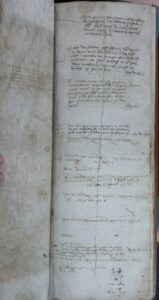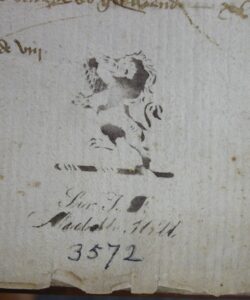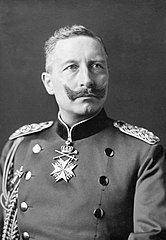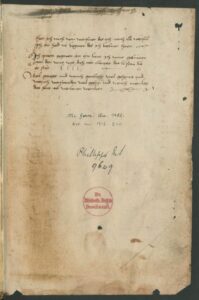As part of our exploration of the manuscripts owned by Sir Thomas Phillipps, Dr Angéline Rais examines the fate of the Swiss manuscripts owned by Phillipps.
Although Sir Thomas Phillipps spent a year in Switzerland in 1822–23 and purchased there more than 250 manuscripts (along with almost 600 printed books), only eight of these have returned to their home country. The majority of the items are now in UCL Library, as well as other European and American institutions. Phillipps’ visits to Fribourg, especially, proved to be very fruitful opportunities to indulge his passion for rare books written on parchment and historical accounts, and on these occasions he obtained fifteen medieval manuscripts from religious institutions, a private collector, and booksellers. Of all these volumes, only one, Nicod du Chastel’s Chronica, the earliest known history of Fribourg dating from 1436, has returned to its home.
This manuscript was offered as lot 422 at the 1911 Phillipps auction, which was particularly strong in items relating to Switzerland and Germany. This sale consequently attracted various Swiss buyers keen to secure works they regarded as evidence of their national heritage. Among them were the Geneva Library’s and State Archives’ curators, who purchased six items through the Swiss Embassy in London; the administrator of the Fribourg Bibliothèque cantonale et universitaire, who acquired three modern documents through Dulau’s; and

Bibliothèque cantonale et universitaire de Fribourg MS L 526 f. 3r and detail of Phillipps’ stamp and number © Public and University Library of Fribourg (Switzerland).
Heinrich Angst, former director of the Schweizerisches Nationalmuseum, who commissioned James Tregaskis to buy fourteen items, including Chastel’s Chronica, to the Fribourg librarian’s dismay. Himself a benefactor of Swiss institutions, Angst later agreed to offer this important manuscript to Fribourg; in 1919, therefore, the Chronica came back to the city where it had been produced almost five hundred years earlier. It is now MS L 526 in the Bibliothèque cantonale et universitaire de Fribourg.
In 1909 Robert Priebsch, Professor of German at UCL, contacted Phillipps’ grandson, Thomas Fitzroy Fenwick to purchase some Phillipps manuscripts as research material, but he failed to secure funding to do so. Three years later, in April 1912, Priebsch and Walter W. Seton, Secretary of UCL, managed to obtain about 250 German and Swiss Phillipps volumes through the support of Sir Max Waechter. This transaction provides rare insights into the use of manuscripts for political purposes at a time of increasing tensions between European states. It also shows that books can be used as carriers of peace and war reparations.
To promote friendly relationships between Britain and Prussia, the German-born Waechter, who had taken British nationality, presented the books to Kaiser Wilhelm II, who was to divide them into two portions of equal value: UCL Library would receive one half, the Berlin Königliche Bibliothek the other half. However, things did not go as hoped.
Once the manuscripts arrived in Berlin, Adolf von Harnack, director of the Königliche Bibliothek, compiled a list of the items he considered relevant to German studies; the other ‘unnecessary’ documents were 99 modern Swiss manuscripts sent back to London. In addition to political and diplomatic aspects, it seems that personal rancour also played a significant role in this story, since Harnack blamed Priebsch for being a traitor to the nation in seeking to secure German manuscripts in London (Priebsch was in fact born in the Austro-Hungarian Empire). In February 1918, when this story was made public, Waechter had to explain his initial objective in the Daily Mail. Following this, Fenwick replied in the same newspaper that the manuscripts in Berlin, ‘obtained by the characteristically German duplicity of the Kaiser’, would have to be returned to London when Britain was victorious in the
war. This did not happen, and the manuscripts, including a Liederbuch made in Germany which still bears its Phillipps number (now MS germ. qu. 1480), remain in Berlin.
Follow @cultivate_mss for more on Phillipps and his manuscripts.




